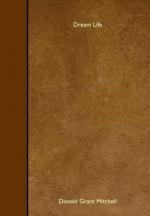There are in the Squire’s pew long, faded, crimson cushions, which, it seems to you, must date back nearly to the commencement of the Christian era in this country. There are also sundry old thumb-worn copies of Dr. Dwight’s Version of the Psalms of David,—“appointed to be sung in churches by authority of the General Association of the State of Connecticut.” The sides of Dr. Dwight’s Version are, you observe, sadly warped and weather-stained; and from some stray figures which appear upon a fly-leaf you are constrained to think, that the Squire has sometimes employed a quiet interval of the service with reckoning up the contents of the old stocking-leg at home.
The parson is a stout man, remarkable in your opinion chiefly for a yellowish-brown wig, a strong nasal tone, and occasional violent thumps upon the little, dingy, red velvet cushion, studded with brass tacks, at the top of the desk. You do not altogether admire his style; and by the time he has entered upon his “Fourthly,” you give your attention in despair to a new reading (it must be the twentieth) of the preface to Dr. Dwight’s Version of the Psalms.
The singing has a charm for you. There is a long, thin-faced, flax-haired man, who carries a tuning-fork in his waistcoat-pocket, and who leads the choir. His position is in the very front rank of gallery benches facing the desk; and by the time the old clergyman has read two verses of the psalm, the country chorister turns around to his little group of aids—consisting of the blacksmith, a carroty-headed schoolmaster, two women in snuff-colored silks, and a girl in pink bonnet—to announce the tune.
This being done in an authoritative manner, he lifts his long music-book—glances again at his little company,—clears his throat by a powerful ahem, followed by a powerful use of a bandanna pocket-handkerchief,—draws out his tuning-fork, and waits for the parson to close his reading. He now reviews once more his company,—throws a reproving glance at the young woman in the pink hat, who at the moment is biting off a stout bunch of fennel,—lifts his music-book,—thumps upon the rail with his fork,—listens keenly,—gives a slight ahem,—falls into the cadence,—swells into a strong crescendo,—catches at the first word of the line as if he were afraid it might get away,—turns to his company,—lifts his music-book with spirit, gives it a powerful slap with the disengaged hand, and with a majestic toss of the head soars away, with half the women below straggling on in his wake, into some such brave old melody as—LITCHFIELD!
Being a visitor, and in the Squire’s pew, you are naturally an object of considerable attention to the girls about your age, as well as to a great many fat old ladies in iron spectacles, who mortify you excessively by patting you under the chin after church; and insist upon mistaking you for Frank; and force upon you very dry cookies spiced with caraway seeds.




